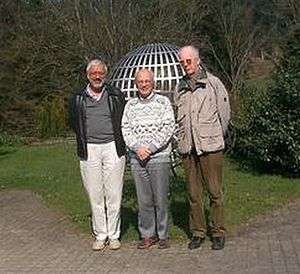Helmut Schwichtenberg
Helmut Schwichtenberg (born April 5, 1942[1] in Żagań) is a German mathematical logician.

Schwichtenberg studied mathematics from 1961 at the FU Berlin and from 1964 at the University of Münster, where he received his doctorate in 1968 from Dieter Rödding.[1][2][3] He then worked as an assistant and then as a professor in Münster, and since 1978 has been professor of mathematical logic at the Ludwig-Maximilians-Universität Munich[1] (successor of Kurt Schütte).
Schwichtenberg deals, among other things, with proof theory, theory of computability, lambda calculus and with applications of logic in computer science.
He is a member of the Bavarian Academy of Sciences.
Selected publications
- Helmut Schwichtenberg and Kurt Schütte (1990). "Mathematische Logik". In Gerd Fischer and Friedrich Hirzebruch and Winfried Scharlau and Willi Törnig (ed.). Ein Jahrhundert Mathematik, 1890–1990 – Festschrift zum Jubiläum der DMV. Dokumente zur Geschichte der Mathematik (in German). 6. Braunschweig: Vieweg. pp. 717–740. ISBN 3-528-06326-2.
- Helmut Schwichtenberg and Anne S. Troelstra (1996). Basic Proof Theory. Cambridge Tracts in Theoretical Computer Science. 43 (1st ed.). Cambridge: Cambridge University Press. ISBN 0-521-57223-1. (2nd edition 2000: ISBN 0-521-77911-1)
- Helmut Schwichtenberg and Stanley S. Wainer (2012). Proofs and Computations. Cambridge: Cambridge University Press. ISBN 978-0-521-51769-0.
- Helmut Schwichtenberg (2006). "An arithmetic for polynomial-time computation". Theoretical Computer Science. 357 (1–3): 202–214. doi:10.1016/j.tcs.2006.03.019.
gollark: I got us one (1) role slot.
gollark: But grass is more common.
gollark: If you are converting the cellulosey bits you could just get rid of the lignin *or* take out the cellulose.
gollark: ?news
gollark: Consequentialist-ly speaking (yes, I am aware you don't subscribe to this) a technological development could be "bad", if the majority of the possible uses for it are negative, or it's most likely to be used for negative things. To what extent any technology actually falls into that is a separate issue though.
References
- Jürgen Elstrodt and Norbert Schmitz (Apr 2013). "Ehemalige Professoren 1945–1969". Entwicklung der Mathematik an der Universität Münster (PDF) (in German). p. 283.
- Helmut Schwichtenberg (1968). Eine Klassifikation der mehrfach-rekursiven Punktionen [A Classification of Multiple Recursive Functions] (PDF) (Ph.D. thesis) (in German). Universität Münster.
- Helmut Schwichtenberg at the Mathematics Genealogy Project
External links
- Homepage at Ludwig-Maximilians-Universität Munich
This article is issued from Wikipedia. The text is licensed under Creative Commons - Attribution - Sharealike. Additional terms may apply for the media files.